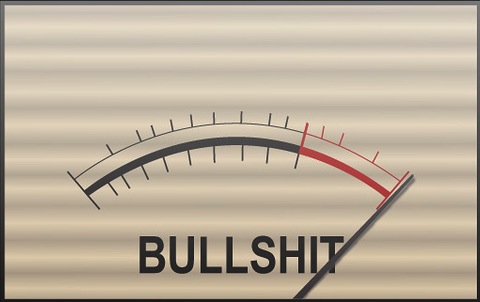May
18
2021
 The term “bullshitting” (in addition to its colloquial use) is a technical psychological term that means, “communication characterised by an intent to be convincing or impressive without concern for truth.” This is not the same as lying, in which one knows what they are saying is false. Bullshitters simply are indifferent to whether or not what they say is true. Their speech is optimized for sounding impressive, not accuracy. I have discussed before research showing that people who are more receptive to “pseudoprofound bullshit” are also more gullible in their evaluation of fake news and false claims. Pseudoprofound bullshit are statements that superficially sound wise but are actually vacuous, and operationally for these studies are generated randomly, such as “Innocence gives rise to subjective chaos.”
The term “bullshitting” (in addition to its colloquial use) is a technical psychological term that means, “communication characterised by an intent to be convincing or impressive without concern for truth.” This is not the same as lying, in which one knows what they are saying is false. Bullshitters simply are indifferent to whether or not what they say is true. Their speech is optimized for sounding impressive, not accuracy. I have discussed before research showing that people who are more receptive to “pseudoprofound bullshit” are also more gullible in their evaluation of fake news and false claims. Pseudoprofound bullshit are statements that superficially sound wise but are actually vacuous, and operationally for these studies are generated randomly, such as “Innocence gives rise to subjective chaos.”
A new study extends this bullshit research further by looking at the measured and perceived intelligence of subjects correlated to their ability to generate bullshit and receptivity towards it. The study is done to test an evolutionary hypothesis that intelligence evolved largely to provide social skill. Humans are an intensely social species, and the ability to navigate a complex social network requires cognitive skill. Therefore, the authors hypothesize, if this is true that the ability to bullshit (which is used as a marker for social skill) should correlate with intelligence. While the results of the study, which I will get to shortly, are interesting, I think we have to recognize that it is horrifically difficult to make such evolutionary statements of cause and effect.
Cognitive ability is so multifaceted that boiling down selective pressures to any one factor is essentially impossible. At best we can say that the ability to sound confident and convincing is a social skill that would provide one type of advantage to a social species. But we also have to recognize that individuals may pursue many different strategies favoring different attributes. Further, other personality characteristics could have a great influence on the willingness and ability to bullshit that have nothing to do with intelligence. And finally, intelligence bestows so many general advantages that could provide selective reinforcement that, again, it becomes problematic at best to isolate one factor as dominant. While I found the results of this study interesting, there is nothing here that is not incompatible with the interpretation that they are all epiphenomena, not primary selective pressures.
Continue Reading »
Apr
08
2019
 Often times when I state that I do not accept a claim at face value, I am challenged with the question – “Well, do you think they are lying?” The question results from a false dichotomy – that someone is either telling the truth or consciously lying. It misses a phenomenon that is perhaps vastly more large than conscious lying – bullshit.
Often times when I state that I do not accept a claim at face value, I am challenged with the question – “Well, do you think they are lying?” The question results from a false dichotomy – that someone is either telling the truth or consciously lying. It misses a phenomenon that is perhaps vastly more large than conscious lying – bullshit.
Lying is when you say something that you know to be false. Bullshitting is when you say something that you don’t know is true or not. There is a spectrum here also, where people may be exaggerating or stretching what they know to be true, mixing in speculation and opinion with facts, distorting what is known with a conscious or unconscious agenda (motivated reasoning), or they are simply gullible themselves. How carefully do you vet a specific piece of information before you accept it and repeat it as true, and how transparent are you about your sources and your confidence in the information?
Most people, I would argue, are not careful enough. Being skeptical is essentially about being really careful and transparent about the information you accept.
Psychological researchers are trying to understand the phenomenon of bullshit, and actually use that term in the literature. A recent study extends this a bit, and is in line with previous research. Pennycook and Rand looked at 1,606 participants through online surveys. They evaluated how receptive they are to statements which are referred to as “pseudoprofound bullshit” and also their ability to discriminate real news from fake new.
Pseudoprofound bullshit are statements that are designed to superficially sound deep, but are actually utterly meaningless (think of pretty much anything Deepak Chopra says). For example, “Hidden meaning transforms unparalleled abstract beauty.”
There is even a website that generates random “Chopraesque” statements. For example, it just generated for me, “Innocence gives rise to subjective chaos.” This literally just uses an algorithm to string together random words but structured in such a way as to produce such statements.
Continue Reading »
Aug
20
2018
 I am not talking about dubious research, but rather research into the phenomenon of bullshit (BS) itself. BS has an operational definition or paradigm within psychological research – it is the extent to which subject rate as highly meaningful statements which are crafted to be vacuous, unconcerned about the truth, and lacking in any unambiguous meaning. Think just about anything Deepak Chopra says. Such statements are also called “pseudoprofound” when they are BS and try to sound profound or philosophical.
I am not talking about dubious research, but rather research into the phenomenon of bullshit (BS) itself. BS has an operational definition or paradigm within psychological research – it is the extent to which subject rate as highly meaningful statements which are crafted to be vacuous, unconcerned about the truth, and lacking in any unambiguous meaning. Think just about anything Deepak Chopra says. Such statements are also called “pseudoprofound” when they are BS and try to sound profound or philosophical.
“Intuition expresses visible choices.”
“Meditation makes the entire nervous system go into a field of coherence.”
“Experiential truth belongs to the expansion of abstract beauty.”
One of those quotes is from Chopra, the other two from the Chopra simulator.
A recent study extends the research on BS a bit, but first gives a brief summary of what existing research has found:
Recently, some psychological research has focused on individual differences in the extent to which people perceive bullshit as meaningful. These studies have shown that people who rate bullshit sentences as highly meaningful have more religious and supernatural beliefs, are less reflective, intelligent, and numerate, more prone to ontological confusions and conspiratorial ideation, endorse free market policies more, and have more favorable views of Republican presidential candidates in US politics. The aim of this study is to develop the academic field of bullshit further.
Given the relatively few number of references in the paper, it’s probably best to consider these conclusions preliminary. While many of these features make sense, like being prone to believing in the paranormal and conspiracies, I would want to see some independent replication before making any firm conclusion.
Continue Reading »
Jul
29
2015
 Headlines declare, “To the Moon in Four Hours,” and “Star Trek Impulse Drive,” even from mainstream outlets like the Telegraph.
Headlines declare, “To the Moon in Four Hours,” and “Star Trek Impulse Drive,” even from mainstream outlets like the Telegraph.
This is an old story that will likely rear its head for years to come. It’s the free energy of space travel. The allure is simply too great for the cranks to ignore.
At issue is the EM Drive, which I wrote about here. The makers of the drive claim that it produces thrust without propellant. Physicists say that such a thing would violate the law of conservation of momemntum. Devices that claim to break a well-established law of physics have a terrible track record.
Continue Reading »
May
02
2008
I am not referring to the excellent Showtime series by Penn & Teller – but rather to the very concept of BS. It turns out it is actually a useful concept for science and skepticism. Andy Lewis, who writes the Quackometer blog, recently wrote about the concept of BS as it applies to “alternative medicine”, specifically homeopathy. I liked it and thought the concept can be more generally applicable.
As skeptics we are often confronted with the false dichotomy question of whether or not a certain purveyor of nonsense or woo is self-deluded or a con-artist. My usual response is that for most people they are somewhere along that spectrum, and probably incorporate aspects of both. Since we can’t read minds, we can only guess or infer what a person’s true intentions are. I usually abstain from such speculation – except in cases where the behavior of the pseudoscientist requires conscious fraud. Psychic surgery is a good example. There is no self-deception involved in palming chicken innards and then pretending to psychically remove them from a person who desperately sought your help for their cancer.
Continue Reading »
Jun
04
2021
 Douglas Adams had a talent for irony. In the Hitchhiker’s Guide series he told the tale of a civilization that tried to improve itself by tricking everyone with a useless job into taking a rocket trip to another world (actually to nowhere). For example, one of the discarded people’s jobs was to clean phones. That’s it – they were a phone cleaner. That civilization later collapsed due to a pandemic started by a phone virus.
Douglas Adams had a talent for irony. In the Hitchhiker’s Guide series he told the tale of a civilization that tried to improve itself by tricking everyone with a useless job into taking a rocket trip to another world (actually to nowhere). For example, one of the discarded people’s jobs was to clean phones. That’s it – they were a phone cleaner. That civilization later collapsed due to a pandemic started by a phone virus.
Part of Adams’ humor was taking reality and then pushing it to the absurd, but that core of reality gave his humor more heft. We may not have phone cleaners, but it does seem that certain jobs are less useful than others. Of course there is a certain amount of subjectivity and value judgements here, but there are some jobs that even the people in them judge to be without purpose. The concept of “bullshit jobs” was proposed by anthropologist David Graeber. In his book Bullshit Jobs, he claims that 20-50% of people are in BS jobs, that this number is increasing over time, that BS jobs are concentrated in certain professions, and that such jobs are psychologically unhealthy. New research finds that he was correct in one out of four of these claims.
While Graeber was bringing attention to a real issue, the psychological effects of being in a job that you yourself feel is of no value, when it came to the magnitude of this issue he did not have hard data. He was largely making inferences. This did lead to mixed reviews of his work at the time, with some reviewers finding his arguments often labored. The new research is an extensive survey of workers in Europe between 2005-2015, with over 30,000 responses. Since by his own definition, a BS job is one that even the person in it feels is worthless, the survey relied upon self-report of whether one’s job had value. Those who responded “rarely or never” to the question, “I have the feeling of doing useful work,” were deemed to have a BS job. The total percentage of people in this category was 4.8%. That’s still about one in 20 people, but a far cry from the as high as 50% Graeber claimed.
Continue Reading »
Feb
05
2018
 On the Canadian Entrepreneur show, Dragon’s Den, the dragons were given a demonstration of a clip (that’s right, a small metal clip like you would use to hold papers together or put in your hair) that the creator claimed would improve your balance, strength, and health through the power of “quantum entanglement.” The clips, called Neuro Connect, were “developed” by a chiropractor and his partner. The Dragons fell for it, amazed by the demonstrations, and invested $100,000 for a 30% share.
On the Canadian Entrepreneur show, Dragon’s Den, the dragons were given a demonstration of a clip (that’s right, a small metal clip like you would use to hold papers together or put in your hair) that the creator claimed would improve your balance, strength, and health through the power of “quantum entanglement.” The clips, called Neuro Connect, were “developed” by a chiropractor and his partner. The Dragons fell for it, amazed by the demonstrations, and invested $100,000 for a 30% share.
The show aired, giving a huge boost to the company’s sales. However, the way the show works, even when the Dragons make a deal on camera, the deal is contingent on them doing due diligence for confirmation. When they did they found that there were serious scientific objections to the claims being made by company selling the clips, NeuroReset Inc. The deal was off.
But this did not stop the show from airing. The public did not get the benefit of their due diligence – they protected themselves, but completely threw their audience under the snake oil bus. Canadian news outlet CBC contacted the producer to get their response:
Continue Reading »
Jul
14
2017
 Gwyneth Paltrow has been using her celebrity to promote a “lifestyle brand” she calls “Goop.” The site recommends all sorts of medical nonsense, like detox, earthing, putting stuff up your vagina, and the usual scaremongering about “toxins” or whatever. Recently I wrote about Goop’s promotion of magical stickers that are alleged to align and balance your vibrations.
Gwyneth Paltrow has been using her celebrity to promote a “lifestyle brand” she calls “Goop.” The site recommends all sorts of medical nonsense, like detox, earthing, putting stuff up your vagina, and the usual scaremongering about “toxins” or whatever. Recently I wrote about Goop’s promotion of magical stickers that are alleged to align and balance your vibrations.
Deservedly she has received push back from science communicators who are trying to raise the level of scientific literacy and critical thinking in the world. The concern is that she is spreading misinformation and pseudoscience, which is increasingly harmful in our modern technological world.
One highly vocal critic has been Dr. Jen Gunter, an OB who is particularly offended by the fact that Paltrow wraps her pseudoscientific misinformation in “female empowerment.” I’m sorry, but taking advantage of women by scaring them and selling them nonsense is not empowering – it’s exploitation. Apparently Goop has been stung by this criticism, and decided to hit back. The results are predictably awful, but do provide an opportunity to deconstruct some popular anti-intellectual nonsense.
“Team goop” begins:
As goop has grown, so has the attention we receive. We consistently find ourselves to be of interest to many—and for that, we are grateful—but we also find that there are third parties who critique goop to leverage that interest and bring attention to themselves.
Continue Reading »
Jun
23
2017
 Recently I have been vacillating between two different views of humanity. On the one hand, we all share a core neuropsychology. We are all struggling to get through life with our humble meat machines, complete with cognitive biases, flawed perception and memory, and irrational tendencies.
Recently I have been vacillating between two different views of humanity. On the one hand, we all share a core neuropsychology. We are all struggling to get through life with our humble meat machines, complete with cognitive biases, flawed perception and memory, and irrational tendencies.
On the other hand, it often seems like there are fundamentally different kinds of people in the world. I guess it depends on whether you focus on what we have in common, or what separates us. Articles like this make it difficult not to focus on the latter.
This has been circulating recently so you probably have already seen it – Paltrow’s wretched hive of scum and quackery she calls Goop is promoting a product called Body Vibes. This is the bottom of the barrel of pure pseudoscientific nonsense wrapped in holistic bling. The claims are also nothing new – your body has an energy frequency, and our little sticker (or bracelet, amulet, fez, whatever) will balance your energy vibrations and cure what ails you.
Continue Reading »
Jan
05
2017
As we collectively try to climb out of the smouldering rubble that was “the truth” in 2016 (by which I mean basic intellectual integrity), many people are speculating and trying to wrap their brain around what exactly is happening. Of course, the arbitrary transition to a new calendar year changes nothing. We are still living in the same world that produced the 2016 election.
Many writers have characterized what happened as the “weaponization” of bullshit or misinformation. This is not entirely new, but it did seem to reach new heights, or to cross over some fuzzy threshold to a new level or prominence. The “weaponized” meme is also mainstream; Donna Brazile, for example, is saying that the hacked DNC e-mails were “weaponized” against them.
The two other similar memes that emerged this past year were “post truth” and “fake news.” These were added to older notions of “echochambers” or the fact that many people are living in information bubbles (whether they know it or not).
I think all of these concepts are essentially correct. We are in the midst of a misinformation war (actually many wars on many fronts). Unfortunately, it seems that the side which includes the mainstream media, the experts that provide them with information and analysis, professional journalists and academics, is losing. They are losing primarily because they have not yet adapted to the new battleground – social media. They are like the British fighting in neat rows with their visible red uniforms, while the rebels fire at them concealed behind trees and stone walls.
Continue Reading »
 The term “bullshitting” (in addition to its colloquial use) is a technical psychological term that means, “communication characterised by an intent to be convincing or impressive without concern for truth.” This is not the same as lying, in which one knows what they are saying is false. Bullshitters simply are indifferent to whether or not what they say is true. Their speech is optimized for sounding impressive, not accuracy. I have discussed before research showing that people who are more receptive to “pseudoprofound bullshit” are also more gullible in their evaluation of fake news and false claims. Pseudoprofound bullshit are statements that superficially sound wise but are actually vacuous, and operationally for these studies are generated randomly, such as “Innocence gives rise to subjective chaos.”
The term “bullshitting” (in addition to its colloquial use) is a technical psychological term that means, “communication characterised by an intent to be convincing or impressive without concern for truth.” This is not the same as lying, in which one knows what they are saying is false. Bullshitters simply are indifferent to whether or not what they say is true. Their speech is optimized for sounding impressive, not accuracy. I have discussed before research showing that people who are more receptive to “pseudoprofound bullshit” are also more gullible in their evaluation of fake news and false claims. Pseudoprofound bullshit are statements that superficially sound wise but are actually vacuous, and operationally for these studies are generated randomly, such as “Innocence gives rise to subjective chaos.”
 I am not talking about dubious research, but rather research into the phenomenon of bullshit (BS) itself. BS has an operational definition or paradigm within psychological research – it is the extent to which subject rate as highly meaningful statements which are crafted to be vacuous, unconcerned about the truth, and lacking in any unambiguous meaning. Think just about anything Deepak Chopra says. Such statements are also called “pseudoprofound” when they are BS and try to sound profound or philosophical.
I am not talking about dubious research, but rather research into the phenomenon of bullshit (BS) itself. BS has an operational definition or paradigm within psychological research – it is the extent to which subject rate as highly meaningful statements which are crafted to be vacuous, unconcerned about the truth, and lacking in any unambiguous meaning. Think just about anything Deepak Chopra says. Such statements are also called “pseudoprofound” when they are BS and try to sound profound or philosophical.
 Douglas Adams had a talent for irony. In the Hitchhiker’s Guide series he told the tale of a civilization that tried to improve itself by tricking everyone with a useless job into taking a rocket trip to another world (actually to nowhere). For example, one of the discarded people’s jobs was to clean phones. That’s it – they were a phone cleaner. That civilization later collapsed due to a pandemic started by a phone virus.
Douglas Adams had a talent for irony. In the Hitchhiker’s Guide series he told the tale of a civilization that tried to improve itself by tricking everyone with a useless job into taking a rocket trip to another world (actually to nowhere). For example, one of the discarded people’s jobs was to clean phones. That’s it – they were a phone cleaner. That civilization later collapsed due to a pandemic started by a phone virus. On the Canadian Entrepreneur show, Dragon’s Den, the dragons were given a demonstration of a clip (that’s right, a small metal clip like you would use to hold papers together or put in your hair) that the creator claimed would improve your balance, strength, and health through the power of “quantum entanglement.” The clips, called Neuro Connect, were “developed” by a chiropractor and his partner. The Dragons fell for it, amazed by the demonstrations, and invested $100,000 for a 30% share.
On the Canadian Entrepreneur show, Dragon’s Den, the dragons were given a demonstration of a clip (that’s right, a small metal clip like you would use to hold papers together or put in your hair) that the creator claimed would improve your balance, strength, and health through the power of “quantum entanglement.” The clips, called Neuro Connect, were “developed” by a chiropractor and his partner. The Dragons fell for it, amazed by the demonstrations, and invested $100,000 for a 30% share. Gwyneth Paltrow has been using her celebrity to promote a “lifestyle brand” she calls “Goop.” The site recommends all sorts of medical nonsense, like detox, earthing, putting stuff up your vagina, and the usual scaremongering about “toxins” or whatever.
Gwyneth Paltrow has been using her celebrity to promote a “lifestyle brand” she calls “Goop.” The site recommends all sorts of medical nonsense, like detox, earthing, putting stuff up your vagina, and the usual scaremongering about “toxins” or whatever.  Recently I have been vacillating between two different views of humanity. On the one hand, we all share a core neuropsychology. We are all struggling to get through life with our humble meat machines, complete with cognitive biases, flawed perception and memory, and irrational tendencies.
Recently I have been vacillating between two different views of humanity. On the one hand, we all share a core neuropsychology. We are all struggling to get through life with our humble meat machines, complete with cognitive biases, flawed perception and memory, and irrational tendencies.




